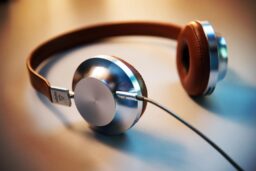Noise-induced hearing loss is common, affecting an estimated 5.2 million young Americans between ages 6-19 and 26 million adults ages 20-69, according to the Centers for Disease Control and Prevention (CDC).
Noise-induced hearing loss is also the only type of hearing loss that can be prevented. Below we review what causes noise-induced hearing loss, what the signs and symptoms are and how to prevent it.
What Causes Noise-Induced Hearing Loss?

In order to understand what causes noise-induced hearing loss, it’s important to understand how we hear.
Soundwaves from the environment are captured by the outer ear and travel down the ear canal, which leads to the eardrum. When the soundwave hits the eardrum, a vibration is created, which passes through three tiny bones within the middle ear called the malleus, incus and stapes. This vibration reaches the fluid-filled cochlea in the inner ear, which causes the fluid to move. This movement activates the tiny hair cells that line the cochlea, called stereocilia, creating an electrical impulse. This electrical impulse travels via the auditory nerve to the brain where it is interpreted as sound.
When dangerously loud sounds pass through the ears, it can damage the stereocilia, leading to permanent sensorineural hearing loss.
Any sound over 85 dB can damage the stereocilia. For reference, below is a list of common sounds and their decibel outputs:
- Normal breathing: 10 dB
- Rustling leaves: 20 dB
- Whispering: 30 dB
- Refrigerator humming: 40 dB
- Normal conversation: 50 dB
- Laughter: 60 dB
- Vacuum cleaner: 70 dB
- City traffic: 80 dB
- Lawnmower: 90 dB
- Garbage truck: 100 dB
- Jackhammer: 110 dB
- Thunder: 120 dB
- Shotgun firing: 130 dB
- Fireworks: 140 dB
What Are the Symptoms of Hearing Loss?
Below are some of the most common signs and symptoms of hearing loss according to the CDC:
- Speech sounds are muffled
- You have trouble hearing high-pitch sounds
- You have difficulty following conversations when there is background noise
- Talking on the phone is difficult
- You have a hard time distinguishing certain consonant sounds (like s and f or p and t)
- You frequently have to ask people to repeat themselves, speak louder or slow down
- You turn up the volume on the TV louder than is comfortable for others
- You have ringing in the ears (tinnitus)
- You are hypersensitive to certain sounds
How to Prevent Noise-Induced Hearing Loss
The best way to prevent noise-induced hearing loss is to wear earplugs during noisy activities like operating power tools or attending a concert at the Denny Sanford Premier Center. Ear, Nose & Throat Consultants offers custom earmolds for maximum comfort and protection. For more information on treating hearing loss or to schedule an appointment, call Ear, Nose & Throat Consultants today.